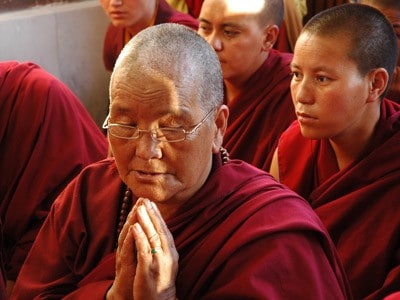Verse 6-3: A clear conscience
Part of a series of talks on the 41 Prayers to Cultivate Bodhicitta from the Avatamsaka Sutra (the Flower Ornament Sutra).
- Our conscience is clear because we don’t do things that make us lose our self-respect
- We don’t do things that harm others intentionally because we really care about the effects of our actions on them
Today, we’ll all continue with the sixth one:
“May all beings wear the robes of integrity and consideration for others.”
This is the prayer of the bodhisattva when putting on clothes.
When we have integrity and consideration for others, then our conscience is clear because we don’t do things that make us lose our self-respect. And we don’t do things that harm others intentionally because we really care about the effects of our actions on them. These are the two mental factors that are missing when we see in modern day society all the various scandals that happen. Politicians saying one thing and doing another. CEOs embezzling money from the companies. Even religious leaders, there’s been a number of scandals in various churches because they say one thing and then they act in another way.
The cause of those problems is first of all the multitude of afflictions, but then also the fact that these two are missing and the two opposites (which are lack of integrity and lack of consideration for others) are present. Those are the cause for people getting themselves in so many difficult situations and hurting so many other sentient beings and making others lose faith in them.
There are so many advantages and benefits if we really keep good ethical conduct with integrity that has our own values and principles and wants to live by them, and then consideration for others that doesn’t want to damage others’ faith in the Dharma or harm others directly. We can really see the benefits of these two and the extreme dangers for ourselves and others of not having them.
Venerable Thubten Chodron
Venerable Chodron emphasizes the practical application of Buddha’s teachings in our daily lives and is especially skilled at explaining them in ways easily understood and practiced by Westerners. She is well known for her warm, humorous, and lucid teachings. She was ordained as a Buddhist nun in 1977 by Kyabje Ling Rinpoche in Dharamsala, India, and in 1986 she received bhikshuni (full) ordination in Taiwan. Read her full bio.


